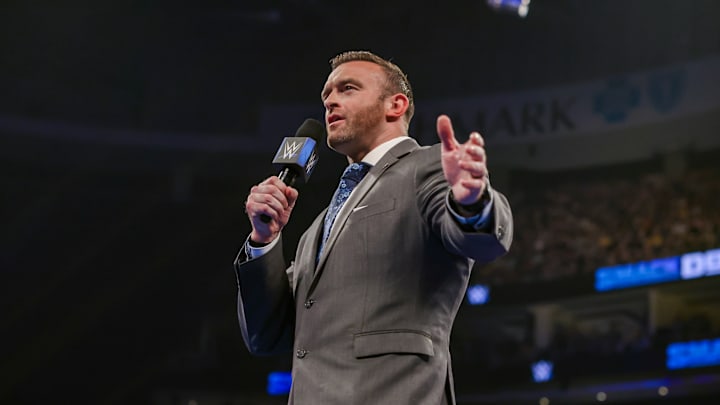The character of the WWE General Manager, or televised authority figure, has fallen by the wayside, especially as many fans prioritize the in-ring action above the other facets of televised wrestling. Nick Aldis and Adam Pearce are working as WWE general managers and improving Raw and Smackdown. When authority goes wrong, as they often do in WWE, they are a distraction. They end up taking away from the superstars without any real purpose. When they work, though, it adds a lot to the brand. In the most successful cases, they have a character that is easily defined, helps to add continuity to a show, and improves the superstars around them. In very different ways, Aldis and Pearce do all three to benefit the WWE Universe and the art of on-screen authority characters.
People on TV need a set personality
Part of the reason that Nick Aldis and Adam Pearce are working as WWE general managers is that they are working as characters. Everyone on TV should have a set character, and the fewer that have a generic "talented wrestler" gimmick, the better in the WWE context. People playing authority are no different. WWE has had generic suits or returning legends come in, make matches, and chew up some of the product's ample screen time. The icons like Eric Bischoff, Teddy Long, and William Regal all had an unmistakable character with clear motivations.
https://t.co/G9YLgqoySg pic.twitter.com/9M15aja82U
— Adam Pearce (@ScrapDaddyAP) February 7, 2024
Nick Aldis is a no-nonsense manager who is driven by providing order and ruling his domain on Fridays. Adam Pearce is a bit more chaotic. His show is more off the wall as he tends to react to situations that arise. Being a laid-back figure, Pearce has done much for some of the lower-card comedy acts, which he screens well with. Nick Aldis has been planted firmly at the main event of his brand, responding to the factional power struggles that have characterized Smackdown under the Bloodline. That they seem like characters of their own is what is what makes these scenes rather than dull interludes to get more people on television.
Including management is important in the presentation
Any place of work needs somebody in charge. An authority figure makes sense for a show like WWE, where matches must be finalized. At the peak of lousy wrestling general managers, fans would look past the logical misgivings to keep the corny overacting at a minimum. When you have figures who are less of a drain on the product, their existence significantly boosts the show's consistency. WWE has been forthcoming with its corporate management after The Rock returned as part of his deal with TKO. However, if WWE has an answer to who is making matches every week, it opens the door for more stories and grounds the entire episode in reality.
To give the fired-up face the rematch he needs, it makes sense to have them talk to Pearce. Nick Aldis on the show ensures the dastardly heel can't always take the easy way out. The upcoming WWE Draft is another reason having authority figures adds consistency. Triple H runs creative for all the brands, and TKO oversees all of WWE's activities. Why would any of them care who is on which show? Aldis and Pearce don't work for both shows, so they add relevance to the proceedings. Does it break the show to have that inconsistency? Maybe not. WWE can have it with two talented men who can help the product, though, so it makes sense to do it.
Creating compelling characters requires some co-stars
When a wrestling promotion has a top new star in the making, they must give them an angle with a worthy challenger. Then rinse and repeat until superstardom is achieved. Of course, that formula is missing some crucial components. Just having a talented roster isn't going to sell a wrestler to a wider audience. If a promoter wants to make a big star, they must use them in compelling television scenes. Interviews and insults can't be the only time fans see a performer. The cast around the superstars matters a great deal.
The talent and experience of Nick Aldis and Adam Pearce are working as WWE general managers to get these other stars over. They add a variety of scenes for superstars to interact with. As friends or adversaries, the general managers let the characters have something to do on screen that isn't fist fights through the crowd. They do not make a wrestling career on their own, but sprinkled in amongst the action and passion, it makes the shows better to watch and lets superstars explore some range as performers.
Thankfully, Nick Aldis and Adam Pearce are working as WWE general managers
With so many ways managers can be a drag on the product, it is excellent that Aldis and Pearce have developed personas working with the WWE Universe. Neither performer will be the main event of a WrestleMania, although, at one time, both could have been. Their role is not to be the star of the broadcast but to make the world in which our favorite superstars compete feel a little less empty or the dreaded F word in wrestling, fake. They add a sense of internal universe logic that matters quite a bit to some fans. The talented Pearce and Aldis should be lauded for taking a role that fans have grown wary of and reminding them how refreshing a compelling authority figure can be.
